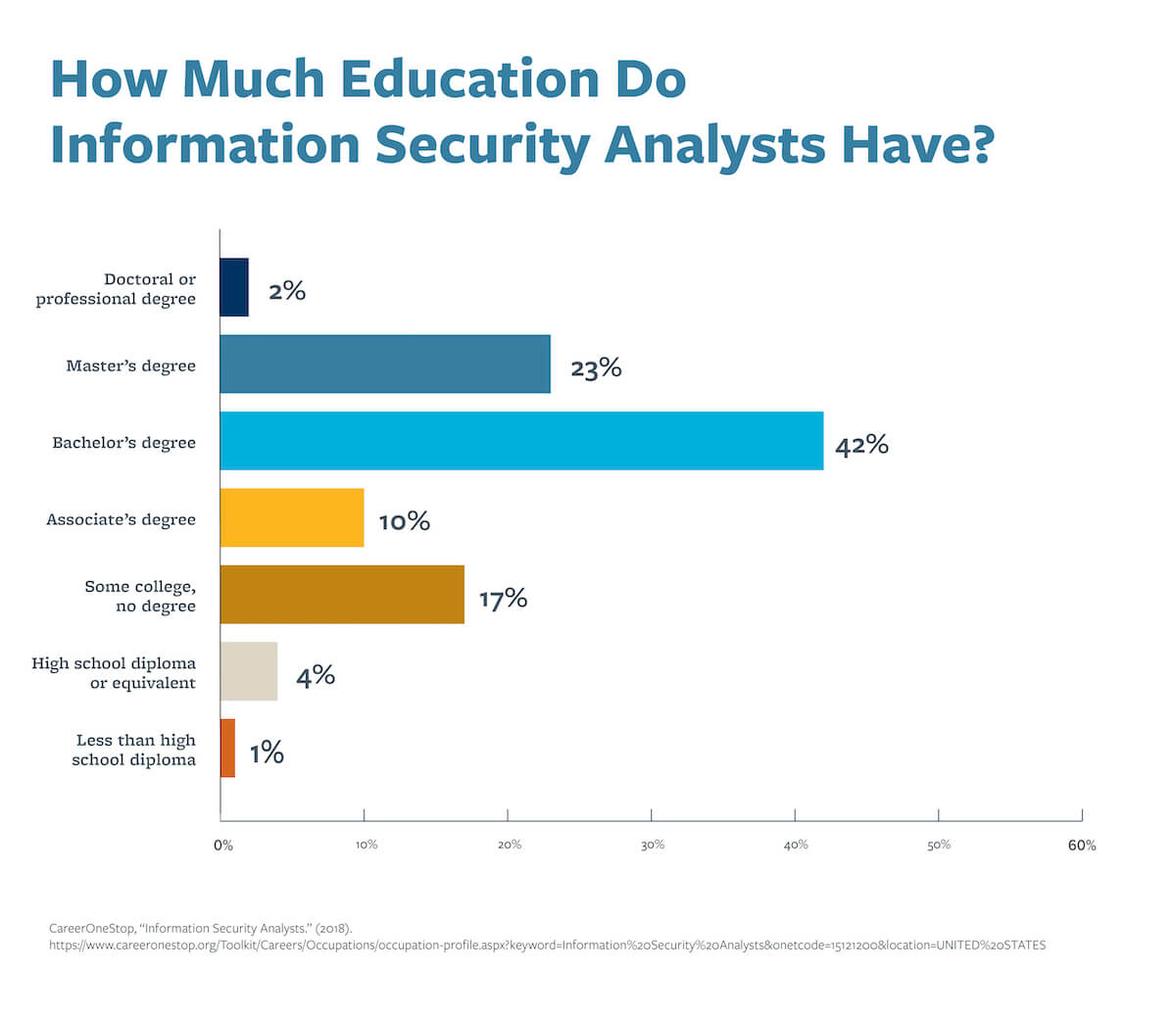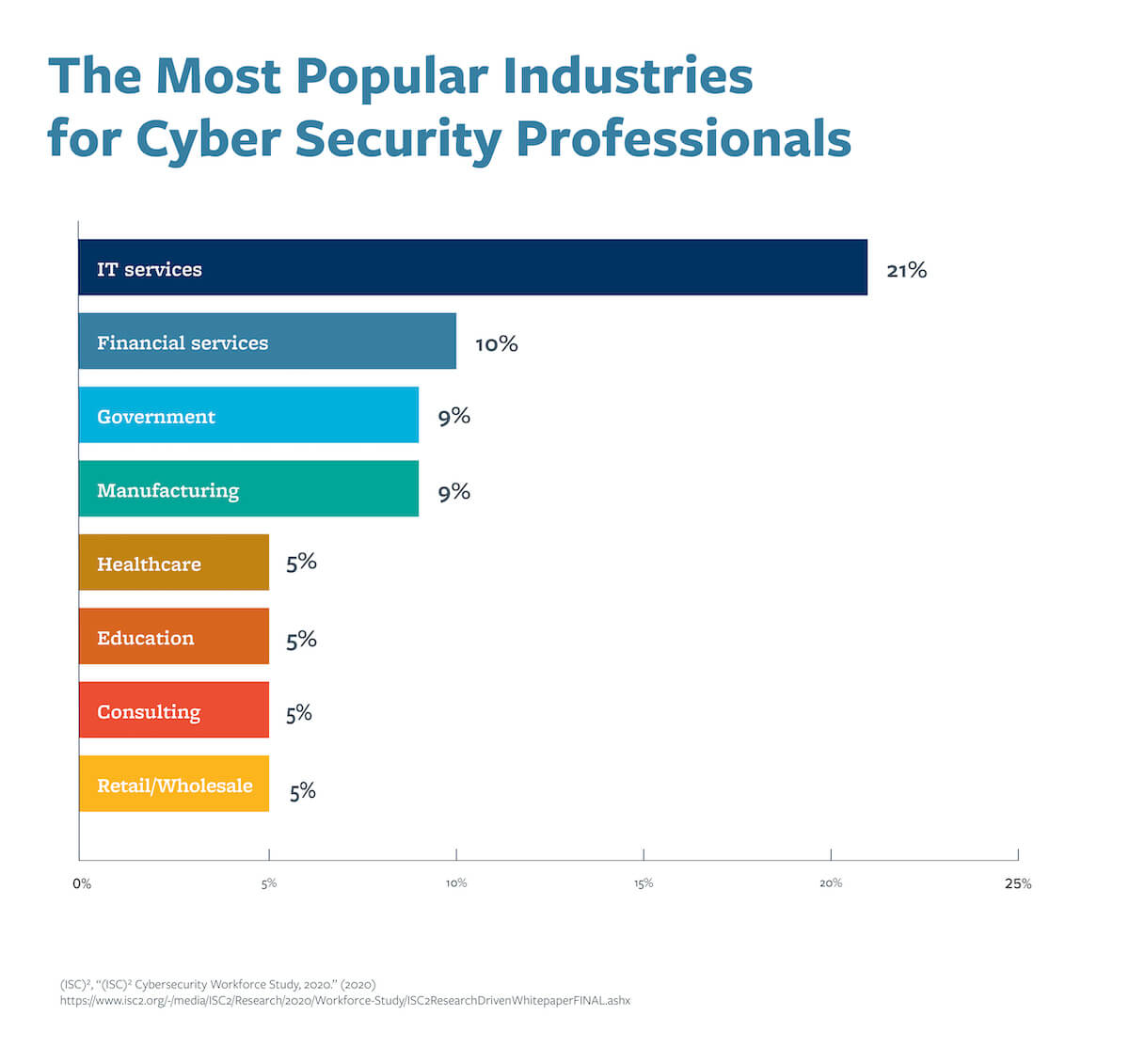Cybercrime reached unprecedented levels in 2020, generating nearly 800,000 complaints in the U.S. and more than $4 billion in losses, according to the FBI’s Internet Crime Complaint Center (PDF, 2.7 MB). Cybercriminals target individuals, companies, colleges and governments alike.
Given these numbers, there’s no doubt that the world desperately needs more cyber security experts to protect it. Will you be one to step up?
If your answer is yes, the first problem you’ll need to tackle is your own education. Cyber security pros need an advanced education — but is a cyber security degree worth it?
In this blog, we’ll answer that question by exploring the types of cyber security degrees, the pros and cons of pursuing one and a few alternate routes to consider.
What Types of Degrees in Cyber Security Are There?
Before we start mapping out specific educational routes, let’s consider the cyber security field as a whole.
Cyber security specialists secure our computers, networks and data. Depending on their specific role, those in the industry might secure sensitive data against breaches, identify potential vulnerabilities or even investigate cybercriminal activity.
This work has real implications for consumers and businesses — so it’s no surprise that cyber security professionals need special training. The question is, how should you go about attaining it?
If you’re considering a cyber security degree, here are few options to consider.
Associate Degree
Two-year degrees in cyber security are predominantly applied science degrees; they provide a foundation in technical and non-technical security skills. They also cover a variety of subspecialties. For example, you could opt for an associate’s degree in cyber security, digital forensics and cyber defense; this would serve as a pathway into government security work.
Associate-level cyber security degrees usually are 60-credit programs and offer flexible learning environments. Many are available online, in-person or via hybrid study models.
Bachelor’s Degree
A bachelor’s degree remains the preferred college credential among cyber security specialists. According to CareerOneStop, 42 percent of those in cyber security hold a bachelor’s degree.

While not all colleges and universities will offer a specific Bachelor’s of Science in cyber security, many do. These are primarily 120-credit programs that focus on disciplines such as information security, computer networking and cyber forensics. Some business schools may also operate similar programs; however, the technical perspective offered by a conventional BS will offer the most direct path into the sector.
Like associate degrees, many bachelor’s degrees can be completed online or in-person.
Master’s Degree
Master’s degrees allow cyber security enthusiasts who already have a degree to advance their industry knowledge and capabilities. These programs are typically between two and three years long, though schedules will, of course, vary between universities.
It’s worth noting that these degrees aren’t only for cyber professionals; those in relevant but non-technical fields such as finance or law might enroll in a Master’s degree to address cybercrime-relevant concerns in their own industries.
Master’s programs are often conducted online, a fact which may weigh as a “pro” for working professionals who don’t have time to travel onto campus for class.
What Does the Degree in Cyber Security Curriculum Typically Include?
No cyber security curriculum is ever set in stone. How could it be, when the subject matter is continually emerging, evolving and otherwise changing?
That said, there are a few assumptions you can make about what a cyber security degree might cover. These courses are often interdisciplinary, covering computer science, law, policy-making, digital forensics, programming and mathematics.
The depth of study will, of course, depend on the degree. Associate’s degrees offer a foundation in cyber security, while bachelor’s degrees incorporate a broader college curriculum. Master’s degrees in cyber security are concentrated programs designed to cultivate a higher or more specialized level of expertise. All will, at a baseline, help you become a cyber security analyst.
So, is a cyber security degree worth it? Only you can decide if their offerings meet your needs.
Here’s an overview of what each degree level can provide.
Associate’s Degree
Digital security is a primary focus for individuals pursuing an associate’s degree in cyber security. Students learn how to protect computer systems and networks against cybercriminals, as well as how to identify breaches. Other critical skills acquired include identifying digital threats, analyzing and mitigating risk and using cyber security tools to bolster security measures.
These programs usually begin by introducing students to computer science fundamentals such as database management and programming. Students may also be asked to complete courses on mathematical topics such as statistics, calculus and analytic geometry. They may also study computer ethics and social science; psychology, for example, could be a relevant topic given that understanding criminal motivations is a crucial aspect of security.
Bachelor’s Degree
Like an associate’s degree, a bachelor’s in cyber security will require fundamental math courses like calculus and discrete mathematics. However, given their longer timelines, these academic programs can take a broader approach. After obtaining their baseline mathematics, students may start by exploring basic network and telecommunications courses, which introduce students to the way computers integrate and share information.
From there, the cyber security degree might progress into legal and regulatory requirements of information security as well as decision theory — a field of study that examines the interplay of interactions between attackers, defenders and users. Students may also study computer application development, linguistics and logic.
Undergraduate instruction isn’t always limited to in-class lectures, either. Motivated students may also attain real-world experience by engaging in internships; in fact, some colleges may even require a semester or two of internship experience!
Master’s Degree
It’s difficult to generalize what a student might get out of a master’s degree given that such programs are often designed around a niche focus.
For example, a postgraduate degree might dive deeper into specific aspects of security, privacy and ethics or look beyond network security to operating systems and software vulnerabilities. Other courses might study advanced topics like encryption and machine learning in detail. Some law-oriented programs could also focus on the legal aspects of privacy and societal considerations, such as how the First Amendment intersects with digital security.
The structure of cyber security master’s programs can vary; however, they generally include a capstone segment, in which students design projects related to cyber security either alone or with a team. Some Master’s programs also organize an immersion module in which students — even those who usually log into class virtually — are asked to attend meetings and workshops in-person.
Pros of Getting a Degree in Cyber Security
Now that we’ve outlined the types of degrees you can get, we can move on to our main question — is a cyber security degree worth it?
Let’s consider the pros.
Exceptional Job Prospects

Online fraud is growing faster than we can stop it. According to the FBI’s Internet Crime Complaint Center (PDF, 2.7 MB), internet crime reports have nearly tripled since 2016 and more than doubled since 2018. In 2020, the Center reported well over 791,000 complaints.
But the expansion of the cyber security talent pool hasn’t kept pace. According to a 2020 report (PDF, 2.7 MB) from the professional cyber security organization (ISC)², there is a significant and troubling workforce gap in the industry. No less than 64 percent of surveyed cyber security professionals say their organizations are at risk due to their lackluster staffing levels.
The workforce gap is evident worldwide but notably pronounced in the United States, where the (ISC)² report cites a shortage of more than 350,000 skilled professionals. The COVID-19 pandemic multiplied this need further. When social distancing restrictions went into place, many companies were forced to expand their security measures to compensate for the vulnerabilities posed by more people working from home.
Taken together, all of these trends point to lofty employment prospects for aspiring cyber security professionals. Data from the U.S. Bureau of Labor Statistics indicates that job opportunities for information security experts will increase by a whopping 31 percent through 2029. That rate is markedly higher than the four percent estimate for all job growth rates.
A Degree Makes You Competitive
While a cyber security degree won’t guarantee a job, it does position you advantageously in the marketplace. According to CareerOneStop, 77 percent of those employed in information security hold at least an associate’s degree. Further, 67 percent have at least a bachelor’s, and 25 percent hold a postgraduate degree. Having some form of higher education will reassure employers of your skills and give you more time and opportunity to hone your specialized knowledge.
Wondering which major will give you your best shot at success? The (ISC)² report (PDF, 1.1 MB) cites computer and information sciences as the most popular path, with 49 percent of professionals reporting some form of that degree.
You’ll Learn Relevant Skills
Cyber security professionals are in demand in nearly every industry and at companies of every size. This is no surprise; after all, their skills are vital to every business that relies on a computer system or has an online presence.
Degree programs in cyber security can offer specialized classes and practical experience in analysis, digital forensics, network and system security, cloud computing and more. These cyber security skills are rare and valuable in the workforce; given the current talent crunch, those who have them will be noticed, if not valued, by employers in the industry.
Plenty of Online Options
For working professionals, finding the time to commute to class isn’t always easy. Fortunately, many degree programs, notably a Master’s in cyber security, can now be completed online. Virtual courses pose another benefit: they allow you to access high-quality instruction from wherever you happen to be — no relocation required.
All this said, career potential is much loftier in some states than others. California, for example, is home to a full third of Cybersecurity Ventures’ Hot 150 Cybersecurity Companies To Watch In 2020 list. As one writer for Cybersecurity Ventures put the matter, “These [jobs], plus hundreds of others in this region have created an extraordinarily competitive market for sales, marketing and engineering talent.”
Countless companies are hiring cyber security analysts — if you have the requisite skill set, your job security is high.
Cons of Getting a Degree in Cyber Security
As we ask — Is a cyber security degree worth it? — we need to weigh the cons.
Since not every aspiring cyber professional is in a position to attend (or revisit) college, here are a few considerations to weigh before pursuing a cyber security degree:
Cost
A four-year degree, though desirable, is expensive. According to U.S. News & World Report, the average private college costs roughly $35,000 per year for tuition and fees. As a result, a four-year degree from a private institution would cost about $140,000 on average. Costs are lower at public colleges (about $9,600 for in-state students, $21,000 for out-of-state) but still require a significant investment.
For some, these costs just may not be feasible. That said, if college fits all of your other needs, you may want to check with your preferred institution to see what scholarships and financing options are available.
Time Commitment
Four years is a long time to commit to attending school full-time. And with master’s programs requiring another 20 months in some cases, including a project, the entire academic process could stretch on for a total of six years.
Of course, those who opt for an associate’s degree only need to study for about two years. However, this is an entry-level path, and those who follow it may need to seek further education down the line.
Do You Need a Degree in Cyber Security to Become a Cyber Security Professional? Alternative Pathways
Here’s an interesting data point, courtesy of (ISC)² (PDF, 1.1 MB): eight percent of cyber security professionals report having only a high school diploma. While it’s not the norm, those seeking to get into cyber security without a degree do have other options.
Let’s consider a few of them now.
Bootcamps
With an intensive focus but flexible scheduling options, bootcamps provide a great academic alternative for students looking to learn cyber security fundamentals on an accelerated timetable. Bootcamps usually can be pursued full-time (in a 12-week program) or part-time (over 24 weeks) to accommodate work requirements or other needs.
A cyber security bootcamp imparts the field’s essentials through online coursework and real-world projects. Students receive training in networks and systems administration, ethical hacking and penetration, risk management, cloud security and much more. The curriculum typically takes a practical approach to prepare students to enter the field with a host of specific skills.
Who might benefit from a bootcamp? Those already working in a technical field can improve their risk assessment and data protection skills to pursue a promotion or career change. Bootcamps also can be the right choice for those seeking a career transition who don’t want to return to college for another degree. After six months, bootcamp graduates have the skills and training to begin applying for jobs in cyber security.
 Live Chat
Live Chat
